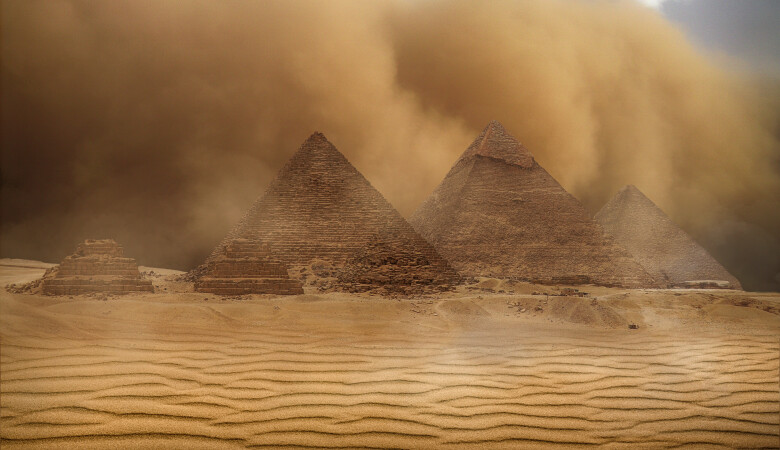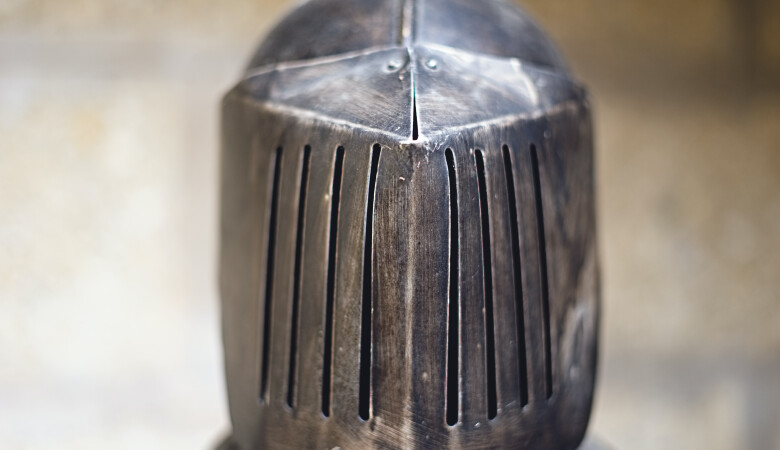Competing High Places: God vs. Man (Isaiah Sermon 2 of 80)
April 27, 2008 | Andy Davis
Isaiah 2:1-22
Exaltation of Christ, Majesty of God
Andy Davis preaches a verse by verse expository sermon on Isaiah 2:1-22. The main subject of the sermon is God's determination to carry out His will despite mankind's obstinate ways.
- SERMON TRANSCRIPT -
I. Peace: The Mountain of the Lord’s Temple Exalted (verses 1-5)
Since the beginning of the church, Christians have speculated about the end times, about the end of the world. Right after the resurrection of Christ, Jesus' apostles thought it was going to happen then. And so in Acts 1:6 they said, "Lord, are You at this time going to restore the kingdom to Israel?" That's the Jewish version of, “Is the end of the world at hand?” They wanted that kingdom to come. Jesus, as you remember, said, "It is not for you to know the times or dates the Father has set by His own authority" (Acts 1:7). Is this the end of the world? That's the question generation after generation have asked. And frequently, the question has been linked to current events, to things that have been happening on the world scene. Perhaps that was no more true than in the year 410, on August 24th, when the walls, the defenses of Rome were breached and Rome fell to a pagan power. It was an earth-shaking moment in history when the Visigoths under Alaric swept through the streets of Rome. They actually treated the city relatively gently, but it was just a shocking moment. Rome, the eternal city had fallen. And in a cave where he was fasting and praying and writing near Bethlehem, Saint Jerome, when he heard about it, began to weep.
And he said, "The world is rushing to ruin. The glorious city, the capital of the Roman empire, has been swallowed up in one conflagration." He thought the end of the world was imminent. But across the Mediterranean Sea in North Africa, in a place called Hippo, there was a different man, Augustine. We know him as Saint Augustine, the great bishop of Hippo in North Africa. He took an entirely different view of the fall of Rome. After Rome fell, he finished his masterpiece called The City of God. It was a defense for Christianity against paganism. The pagan Romans thought that Rome had fallen because of the influence of Christianity, that their military strength had abated, had weakened because of Christianity. So he defends Christianity against paganism. But even more than that, he defends the view of history that comes from the Bible, that we are not stuck to current events. We are not linked to any human city. There are in effect in history two cities. There is the city of God and there is the city of man. And the two of them are competing on infinitely unequal terms. We are not dualists. We don't believe that good and evil battle on equal terms. But they are battling it out for the central place in human hearts and affections.
At the core of the city of man is one driving spirit, and that is love of self, extending to contempt of God. That is the nature of the city of man, love of self that quenches any concern for the glory of God. The city of God has exactly the opposite spirit, love of God that extends to contempt of self. And those two are battling it out all the time on the stage of human history. So the story of human history is this, what some have said is a tale of two cities. It is the city of God and the city of man. And here in Isaiah 2 we have it in this kind of language, in competing high places. We have the high place of the Lord's temple established in the first five verses, and then we have all these other human high places, these lofty towers and these high walls. And the two are in direct competition. You have the city of God and you have the city of man and they are competing for your affection and for mine. It is God versus the world, and that is what is going on in Isaiah 2. And it begins with the vision of peace in verses one through five, “The mountain of the Lord's temple” exalted. It starts in verse two with this expression, "In the last days." "In the last days," it says, "these glorious things are going to come." So this is a constant fascination we have, as I mentioned, with the end of the world.
I will not ask how many of you have read any of the Left Behind series. I don't want to know, okay? But I know this, that 65 million copies have been printed in that series. I know they have a website, leftbehind.com. I'm not mentioning it that you should go there. I am just saying that they have one. I’m just saying that their books and movies and even a computer game, the Left Behind computer game if you can believe that, are sold at Walmart and you can get them. Behind the intense interest in and success of that series is this question: “Are we living in the last days? Are these the end times?” Well the Bible's answer to that question is absolutely clear and unequivocal. Yes, we are most certainly living in the last times. We are even living in the last hour. 1 John 2:18 says this, "Dear children, this is the last hour." Of course, that was written in the first century AD. It has been the last hour all of this time.
Hebrews 1:2 says "In these last days, He has spoken to us by His Son." We are in the last days. Are we the final generation? Now, that's a different question. And Jesus already told us that it is not for us to know the times or dates. He has given us instead a way by which, by what we call the signs of the times, by which we can measure progress toward the end of the world. One of the greatest is in Matthew 24:14. "This gospel of the Kingdom will be preached in the whole world as a testimony to all nations, and then the end will come." So we are watching the progress of the gospel and linking it to the end of the world. Now Isaiah gives us a different sign, and that is the exaltation of the mountain of the Lord and the streaming of the nations. Look what it says in verse two, "In the last days, the mountain of the Lord's temple will be established as chief among the mountains. It will be raised above the hills, and all nations will stream to it." So it begins this vision with the exaltation of the mountain of the Lord's temple.
The Exaltation of the Mountain of the Lord
Now mountains are frequently associated with religions and paganism. You have Mount Olympus and Zeus and all the pantheon of gods up there in Greece. There is Mount Meru in Hinduism, the spiritual origin, so they believe, of all the Hindu deities and their ultimate destination. You have Chomolungma (that's Mount Everest), the goddess mother of the world. In that tribal religion they believe that all the deities came from there. Who could say until 1953? No one got to the top. And so there it is. There are these incredible mountains. And people imagine the deities are up at the top of them.
But this is not any of that. This is no pagan mountain. This is “the mountain of the Lord's temple.” That is what it says. And this is not Mount Sinai where Moses received from God the ten commandments, the old covenant. Actually, you have to go further back in Jewish history, to Genesis 22 when the Lord tested Abraham and said, "Take your son, your only son, Isaac, whom you love, and go to the region of Moriah. Sacrifice him there as a burnt offering on one of the mountains I will tell you about." And he goes to Mount Moriah and is just about to offer Isaac up when the angel of the Lord stops him. But do you remember what Abraham says in Genesis 22? Remember how Isaac had said, "The fire and wood are here… but where is the lamb for the burnt offering?". And Abraham replies, "God himself will provide the lamb." And so there was this saying, "On the mountain of the Lord it will be provided" (verse 14).
If you advance in redemptive history, you have David, of course, taking the Jebusite city, Jerusalem. It was up on a mountain. It was called Mount Zion, the elevated place. It was difficult to get to and easy to defend, but David conquered it. So it became the city of David, the fortress of Zion, and there David wanted to build a temple. Nathan the prophet revealed it would not be David who would build the temple but it would be his son who would build the temple. Now I tell you the Scripture is infinitely deep. What son was Nathan referring to? Was it Solomon or was it Christ? My answer is both. Solomon built the physical temple, and he built it right there on Mount Moriah, the very same mountain, as it says in Chronicles.
So on the mountain of the Lord it was provided, for that's where Jesus died. That is where He shed His blood - in space and time on that very mountain. It really happened. It was physical. It was a place. But we learn from Scripture that the tabernacle and the temple were just dim reflections, just shadows of a reality that is up in heaven. A heavenly reality, a place where God will dwell with man, where man will be forgiven of his sins, and where we will dwell in close fellowship, close partnership. And anything earthly, anything physical, is just a dim reflection of it. So when Jesus shed His blood on the cross, on that physical mountain, on a physical cross, shedding physical blood, the physical curtain in the physical temple was torn in two from top to bottom. And we learn from the Book of Hebrews that a new and living way has been opened up for us spiritually into the very presence of God. As of that moment, there is no longer any need again for animal sacrifice. Animal blood is not needed. In fact, it is not welcome and never will be again. That has been fulfilled in Jesus. And so also the physical temple has been fulfilled. It was just a pattern of the heavenly one anyway.
So what do I believe then? Well, I believe as it says in Hebrews 12:18, "You have not come to a mountain that can be touched and that is burning with fire." We have not come to a physical mountain here in Isaiah 2, but rather we have come to Mount Zion, to the heavenly Jerusalem, the city of the living God. The mountain of the Lord's temple then is the spiritual temple established by the death and resurrection of Jesus Christ. Remember how Jesus said, "Destroy this temple and I will raise it again in three days" (John 2:19). He was speaking of His own body, speaking of the place where sinners would be reconciled to an Almighty God. That is the temple I think Isaiah 2 is mentioning here, and on this mountain God provided a sacrifice for sins through Christ's blood. On this mountain the Lord heard the prayer of the Great High Priest, Jesus Christ, on our behalf. And on this mountain God swallowed up death forever. This is the mountain that is established as chief.
Now Jerusalem was the physical starting place for the spread of the gospel. It started in Jerusalem as Luke 24:47 says, "Repentance and forgiveness of sins will be preached in His name to all nations beginning at Jerusalem." So it started at that physical mountain, Mount Zion, in Jerusalem. But from that physical place, the word of the Lord would spread to the ends of the earth. Look at Verse 3. "The law will go out from Zion, the word of the Lord from Jerusalem." And in this way the mountain of the Lord's temple is established as chief among all the spiritual high places of the earth. It is the place of Jesus. It is the place where He shed His blood. It is the place of the cross. It is the place of free access to almighty God where we can see Him face to face, where we can be in His very presence. That is what is established as chief among all mountains in the world.
The Amazing Streaming of the Nations… Uphill!
So what do we have as a result of the establishment of this place, this high place of the Lord's glory, of Jesus' finished work on the cross? We have the streaming of the nations in a manner entirely contrary to nature. Look what it says, "In the last days the mountain of the Lord's temple will be established as chief among the mountains. It will be raised above the hills and all nations will stream to it. Many peoples will come and say, 'Come, let us go up to the mountain of the Lord, to the house of the God of Jacob.'" So here is this river streaming up hill. It is running contrary to nature. Do you know what the Continental Divide is? The Continental Divide is a mountain ridge where the water on one side flows to the Atlantic and on the other side flows to the Gulf of Mexico, or to the Pacific if it is the Pacific Divide. Water just doesn't flow uphill friends. Water has never flowed from the Pacific up to the Continental Divide. It just doesn't work that way. So this is a streaming of the nations contrary to nature.
It is surprising. It's shocking. It is something only God can do. Why in the world would the nations all be looking to Jerusalem? It really isn't that impressive a city. Why would all nations all over the world be caring about what happened in that small place at that time, 2000 years ago? It is because of the greatness of Christ, the greatness of the gospel. Contrary to nature, the nations are streaming to Jerusalem. Not physically. We are not on a pilgrimage like the Muslims go to Mecca. We don't need to get up and go. You can go there if you like. Some of our number have gone. We love seeing the pictures, and I'd love to go myself. But if I die never having seen physical Jerusalem I'm alright. But I want to see the heavenly Jerusalem!
I want to be there because that is the true place, and that is where I'm streaming to in my heart. That's where I'm on route to. Jesus said, “In my Father's house are many rooms; if it were not so, I would have told you. I am going there to prepare a place for you. And if I go and prepare a place for you, I will come back and take you to be with me that you also may be where I am” (John 14:2,3).That's the streaming that's going on. I want to be with God. That's the streaming that's happening here. And so, the mountain of the Lord's temple is established. Now I know there is a millennial view that says Jesus will reign for a thousand years physically on Earth from Jerusalem. He will establish His throne there. He will settle disputes. People will go and see Him physically. I think that may be. Personally, I am millennial in my theology. I understand that some people focus on this passage as a view of the millennial kingdom. But I think it is so much more glorious to think of a kingdom that will never end. Not one that lasts only a thousand years, but one that lasts for ever and ever. And forever we will be looking for the law coming from Christ's mouth. Amen. And so I think even the millennialists will say, "We look forward to aspects of that going on throughout eternity."
Missions: Come, and Say, “Come!”
And notice what it says here in verse three, "Many peoples will come and say, 'Come, let us go up to the mountain of the Lord, to the house of the God of Jacob.'" This in my mind speaks of the exponential spread of the Gospel of Jesus Christ. The very ones who are coming are saying come to those who aren't yet coming. They are on route, they are traveling, they're on a journey, they're moving on. And they are finding those who aren't moving or who are going in the wrong direction. They are dead in their transgressions and sins, and they invite them to come. And so this is the spread of the gospel. We begin life, therefore, as targets for evangelism and, God willing, we end life as evangelists ourselves, reaching out with the gospel. And so it says at the very end of the Bible, in Revelations 22:17, "The Spirit and the bride say, 'Come!’'" So we are in cooperation with the spirit of God inviting people who aren't coming yet to come. “The Spirit and the bride say ‘come!’ And let him who hears say ‘come!’ Whoever is thirsty, let him come; and whoever wishes, let him take the free gift of the water of life.” And as we're coming, we are hearing the law coming from the mouth of the lawgiver, Christ Himself. Again, verse three says, "He will teach us His ways, so that we may walk in His paths. The law will go out from Zion, the word of the Lord from Jerusalem."
The Law of the Lord: He Will Teach Us His Ways
The Gospel is meant to have a transforming effect on every area of your life. How you think, how you move in this world, what you do with your money. Everything. And the law is coming from Christ. He is speaking the law to us. His laws are written in our minds and on our hearts, not external to us like laws engraved on tablets of stone. Christ's law of love comes and drives out strife between former enemies. Christ's law of holiness comes and causes us to put sin to death. Christ's law of obedience causes us to come and walk in obedience to the spiritual laws written now in our hearts. And the Gospel ministry is at the center of it, as Matthew 28:19 says, “teaching them to obey everything I have commanded you.” The law streams forth from this spiritual temple, from the mouth of our lawgiver, Jesus Christ. And what is the result? Well, lasting peace, friends. Not man made, but God made. Look at verse four, a very famous verse. "He will judge between the nations and will settle disputes for many peoples. They will beat their swords into plowshares and their spears into pruning hooks. Nation will not take up sword against nation, nor will they train for war anymore."
Lasting Peace: Not Man-Made, God-Made!
The result of the Gospel, the result of the establishment of the glory of God through Christ, is lasting peace between people. Peace between nations - something that has not been achievable. In 5000 plus years of human history we have not been able to establish lasting peace between the nations. And we will not. Only the Lord can do this. We learned this in the 20th century, didn't we? There was World War I, the war to end all wars. 37.5 million casualties, a very high price to pay to end all wars, but worth it if you are going to do it, if you are actually going to end all wars. And at the end of that war they set up the League of Nations under Present Wilson to make sure we didn't have war anymore. Well, we know how successful that was because just a few decades later, in 1939 Hitler invaded Poland and began World War II. And the price tag for that war was 72 million killed. The greatest carnage of any war that has ever been. Right after that, of course, they established the United Nations so that we wouldn't go to war with each other anymore. We would think 72 million would be a small price to pay if we never went to war with each other again. And so the top priority of the United Nations, established on October 24, 1945, was to keep peace throughout the world.
"The result of the Gospel, the result of the establishment of the glory of God through Christ, is lasting peace between people. "
I don't know how you count a war. What distinguishes a war from just a skirmish or a border issue? But some analysts have counted over 150 armed conflicts between nations since that time. I believe that lasting peace is impossible in this world because of the wickedness of human hearts. If you don't change the heart, you're not going to change politics, you're not going to change history. The heart must change. And what does it say about the human heart in Isaiah 57:20-21? it says, "The wicked are like the tossing sea, which cannot rest, whose waves cast up mire and mud. ‘There is no peace,’ says my God, ‘for the wicked.’" Here’s the bottom line. Wicked people don't naturally beat their swords into plowshares and their spears into pruning hooks. They don't. They make more swords and they get ready because they want to win. They want to dominate. I think about the image of the sword being beaten into a plowshare. I get the picture of the hammer and sickle, I don't know why. Actually, there isn't necessarily a Biblical background to this. I tried to establish that, but I do know this. In 1959 the Soviet Union donated to the United Nations a big brawn statue called, “We shall beat our swords into plowshares,” patterned after this Biblical verse that they didn't believe in. Bbut they did believe in the theme of world peace and they thought it could be established by their means.
The statue is still there in the north garden of the United Nations, some big muscular guy beating his sword into a plowshare. Of course, at that point the United States and Soviet Union were in negotiations with each other, trying to establish a lasting peace between their countries in the midst of the cold war. And so they came up with the McCloy-Zorin Accords, a joint statement of agreed principles for disarmament negotiations. Their first goal - get this! - was that disarmament should be general and complete and war is no longer an instrument for settling international problems. Sounds good, especially in the middle of a cold war. Of course, within a year or two there was the Cuban missile crisis and the accords went right out the window.
Actually, as I look at these principles, I think about the letter that was signed between Neville Chamberlain and Adolph Hitler after the Munich accord, which sold Czechoslovakia up the river and just about guaranteed World War II would come. Appeasement had run it's course. But Neville Chamberlain thought they had purchased “peace in our time.” Recall Chamberlain waving that letter and announcing, “We regard the agreement signed last night and the Anglo German naval agreement as symbolic of the desire of our two peoples never to go to war with one another again.” Doesn't that sound wonderful? Don't you just cheer in Trafalgar Square that we're not going to fight the Germans after all? Of course, within a year they declared war on Nazi Germany. The reason is the human heart hasn't changed. Hitler was a wolf. He wanted the whole world. That was the whole issue. True lasting peace comes only in one way, the saving work of Jesus Christ on the wicked, selfish, angry, prideful, murderous, covetous, power hungry human heart. Only if the heart changes will war be obsolete and He is the only one that can do it. It is His unique glory. You know the hymn, 'Crown Him With Many Crowns'? Listen to this: “Crown Him the Lord of peace, whose power a scepter sways, from pole to pole, that wars may cease and all be prayer and praise. His reign shall know no end, and round His pierced feet, fair flowers of paradise extend, their fragrance ever sweet.” Isaiah 2:1-4 is a clear prediction that someday war will be obsolete. Amen?
It's going to be gone. To the glory of Christ though, not to the glory of negotiating. Not to anybody who's going to win the Nobel Peace Prize. Nobody's going to take credit for it. It's going to be Christ's work and His work alone. But it's going to come. Now it ends with an exhortation. Isaiah gives an exhortation to his own people concerning these things. Look at verse five. "Come, O house of Jacob, let us walk in the light of the Lord." But then tragically, he spends the rest of the chapter saying how much they do not walk in the light of the Lord. And not just Israel. Israel is just a kind of test nation for all of us. We wouldn't have done any better. It doesn't matter what your tribal ancestry is. You can't imagine you would have done better, or your ancestors would have done better than the Jews. They represent us all. But he starts with the Jews and he shows very plainly that they refuse to walk in the light of the Lord.
II. Shame: Full of Things, Empty of God (verses 6-9)
He begins with Jacob's shame in verses six through nine. We see Jacob abandoned to idols. Look at verse eight, "Their land is full of idols; they bow down to the work of their hands, to what their fingers have made." He begins by lamenting the fact that Israel is abandoned by God. This abandoning, he readily admits, is justified because of Jacob's great sin.
Israel has committed two great sins according to the prophet Jeremiah. He says, in Jeremiah 2:13, "My people have committed two sins. Number one, they have forsaken Me, the spring of living water, and number two, they have dug for themselves their own cisterns, broken cisterns that cannot hold water." Here are two great sins. Turning away from God, the all satisfying stream of living water and deciding to dig out your own cisterns. And drinking from your own water source. Those are two related sins. John Piper identifies this is as the shocking two-fold root of all sin, the forsaking of God and the desire to find ultimate satisfaction and pleasure from some created thing. This is what Piper writes. "Tell me then, what is evil? The definition of evil, that which appalls the universe, that causes the angels of God to say, ‘No it can't be!’ What is it? What is evil? It is looking at God, the fountain of all-satisfying, living water, and saying, ‘No thank you,’ and turning instead to the television, to sex, parties, booze, money, prestige, a house in the suburbs, a vacation, a new computer program, and saying ‘yes!’ to those things. That’s insane! And it causes all heaven to be appalled, according to Jeremiah 2:12”. That is what they were doing. They were turning away from God and turning to idols - anything made to satisfy apart from God. And so three times in the section, Isaiah says that Israel is full of something, but not of God. Full of something, but not what God provided. We were created dependent. We come into the world, our lungs are empty. They need air. Our stomachs get cyclically empty. They need food. We are dependent on God, and that physical dependency is meant to teach us something spiritually. We need to be filled with God. We need to be filled with Him.
Full of Superstitions, Not of True Religion
But look at what they are filled with. They are filled, first of all, with superstitions. Look at verse six. “They are full of superstitions from the East; they practice divination like the Philistines and clasp hands with pagans.” They were created to have minds full of true religion, based on the revelation of God. Instead, what do they do? They turn to pagan religions, mystery religions, with their secret rituals at night and their orgies and their lustful things. They turn to the secret pagan religions, superstitions, from the east.
Full of Silver and Gold, Not of True Wealth
Secondly, they're full of silver and gold, not of true wealth. Look at verse seven. “Their land is full of silver and gold; there is no end to their treasures.” Now God had specifically forbidden the kings of Israel to accumulate large amounts of silver and gold. In Deuteronomy 17:17 and following, it says, speaking of the king, “He must not take many wives, or his heart will be led astray. He must not accumulate large amounts of silver and gold.” Rather, the king was to take and write for himself a copy of the book of Deuteronomy and read it every day and fill his mind with God as his treasure. That is what he was supposed to do. Well, then you get Solomon. I can sum up Solomon's life in these words: Solomon accumulated. It is in there a number of times. Solomon accumulated wives. He had lots of them. Solomon accumulated silver and gold. The trading ships came in every year, bringing 666 talents of gold. He was swimming in gold. There was so much silver, it meant nothing in those days. Well, all the kings after him, though not achieving that level of glory and wealth, yearned for it. They wanted silver and gold. This is idolatry. It's greed, materialism, a lust for wealth and the pleasure of possession, of ownership.
Full of Horses and Chariots, Not of True Power
Also, they are full of horses and chariots, not of true power. Look at verse seven. “Their land is full of horses; there is no end to their chariots.” Just as bad was the Jewish accumulation of military power. Again, from Deuteronomy 17:16, “The king, moreover, must not acquire great numbers of horses for himself or make the people return to Egypt to get more of them.” But in 1 Kings 10:26, it says, “Solomon accumulated” [there's that word again]. “Solomon accumulated chariots and horses. He had 1,400 chariots and 12,000 horses.” What is the problem here? Well, God did not want the Jews relying on their military strength for their protection and their defense. He wanted Gideon to strip his army down to 300 so that God would get the glory for the deliverance. Later, in Isaiah, we'll see King Ahaz turning to Assyria instead of to God for protection. He was angry with David for numbering the fighting men in Israel. He did not want their hearts trusting in their own military prowess for their security.
This is a great temptation in our day as well. A terrible temptation. In 2006, 1.1 trillion dollars were spent by the nations of the world on military things. By world governments, 1.1 trillion dollars. The United States spent 48% of that. As a matter of fact, if you add up the military spending by nations number two through eleven, we exceed that. Nation number two plus three plus four plus five. We exceed the next ten nations in military spending. We spend close to $650 billion a year on the military. It is easy, then, for our nation to be tempted into thinking that therein lies our national security. It does not. Every military system has a chink in its armor, something that God can find. An arrow can be shot at random and fly through the air and find that chink in the armor. That is not our security, friends. It does not come from those things. National security is hearing and obeying the word of God. That's it.
And you Christians, you know it, don't you? It comes in following Christ, in knowing Him, and in the prayers of the people, not in how much money we spend. We would not be a little more secure if we spent another $100 billion. It just doesn't work that way. The most powerful force in the universe is God. Isaiah 40:15 says, "Surely the nations are like a drop in a bucket; they are regarded as dust on the scales. He weighs the islands as though they were fine dust." The most powerful thing in the universe is God. If we are in a right relationship with Him, we need fear nothing. But if He is against us, then who could be for us? Israel had abandoned the true power and settled for military power. Psalm 33:16-21 says, "No king is saved by the size of his army; no warrior escapes by his great strength. A horse is a vain hope for deliverance; despite all its great strength it cannot save. But the eyes of the Lord are on those who fear Him, on those whose hope is in His unfailing love, to deliver them from death and keep them alive in famine. We wait and hope for the Lord. He is our help and our shield. In Him our hearts rejoice, for we trust in His holy name." Now that's what a secure people can say and should say in prayer.
Full of Idols, Not of the Lord
Finally, the land was full of idols, not of the Lord. See verses eight and nine. "Their land is full of idols; they bow down to the work of their hands, to what their fingers have made. So man will be brought low and mankind humbled - do not forgive them." Now as I've said, anything you look to for ultimate peace, ultimate significance, ultimate security or ultimate happiness other than the Lord is an idol. That's what it is. But the Jews went beyond that. They actually made physical representations. They actually made figurines. They made physical idols out of material stuff. It is amazing arrogance. It is one thing to trade God for some heart idol. It is another thing to think of God in your mind and make up a physical manifestation of your god and then bow down and worship it. And that is what the Jews were doing. I believe in the end all idolatry is really a form of self-worship. The artisan makes his image of God out of his own skill, out of his own ability, and then he honors and worships it.
Listen to Isaiah 44:13. "The carpenter measures with the line and makes an outline with a marker. He roughs it out with chisels and marks it with compasses. He shapes it in the form of man, of man in all his glory, that it may dwell in a shrine." What is he then worshipping when he bows down? He's worshipping himself! It's human arrogance, idolatry. And notice, by the way, the land is full of idols. One isn't enough. You are not going to have just one idol. Once you have one, you're going to have many. The more the better. I've been to India. I've seen idols everywhere. I've been to other countries. In Japan on every street corner there was an idol. They were everywhere. You are not going to just have one. But the Jews were like this, Jeremiah 2:28 says, "You have as many gods as you have towns, O Judah."
III. Terror: Lofty things Humbled (verses 10-21)
The Day of the Lord Proclaimed
For all of these reasons God had abandoned His people to judgment. That judgment Isaiah now seeks to describe in verses 12-21. Terror. The loftiness of created things humbled. The day of the Lord is proclaimed in verse 12. Look at it: "The Lord Almighty has a day in store for all the proud and lofty, for all that is exalted, and they will be humbled." Simply put, the Lord has a day. It is coming. It's called The Day of the Lord. It's coming. There have been a lot of little days of the Lord that have given a picture of it, like Noah's flood and Sodom and Gomorrah. There have been pictures, but they are not the final thing. The Day of the Lord is coming. The Lord has a day in store. Now is the day of rebellion. Now is the day of sin. Now is the day of arrogance. Now is the day of man. Then is the Day of the Lord.
The Day of the Lord Described: Lofty Things Humbled
And the Day of the Lord is described basically like this: lofty things will be humbled and brought down. That's it. The purpose of the Day of the Lord is justice. For anything in God's universe to compete with Him is abhorrent. It is the greatest injustice. So He is going to bring justice. He is going to level the idols. Now pride is the root of all of this. It is the root of Satan's sin. There is a sense of lofty elevation. Satan, not satisfied with his position, wanted upward mobility. He wanted to go up in the universe. So it says in Isaiah 14, "You said in your heart, 'I will ascend to heaven; I will raise my throne above the stars of God; I will sit enthroned on the mount of assembly, on the utmost heights of the sacred mountain. I will ascend above the tops of the clouds; I will make myself like the Most High.'" “I'm going up to where God is.” Well that sense of elevation and loftiness is of majesty where God dwells.
Isaiah 6:1, "In the year that King Uzziah died, I saw the Lord seated on a throne, high and exalted. And the train of His robe filled the temple." It's the greatness, the elevation of God. Satan wants to compete, so he goes up. We joined him in that rebellion. We actually decided to go upward. We decided to elevate ourselves, to become prideful and to go up, to follow Satan. We joined Satan in that upwardly mobile pride. And so here in Isaiah 2, he says "All of that is coming down." Look what it says in verses 12-17: "The Lord Almighty has a day in store for all the proud and lofty, for all that is exalted (and they will be humbled), for all the cedars of Lebanon, tall and lofty, and all the oaks of Bashan, for all the towering mountains and all the high hills, for every lofty tower and every fortified wall, for every trading ship and every stately vessel. The arrogance of man will be brought low and the pride of men humbled."
He uses natural lofty things like cedars of Lebanon and oaks of Bashan and towering mountains and high hills. He uses man-made lofty things like lofty towers and fortified walls representing military pride, trading ships that represents commerce, stately pleasure vehicles representing pleasure. All of these are human idols. They are all lofty in their own estimation. They are coming down on the Day of the Lord. All lofty things set up against the knowledge of God, all of His rivals are coming down in the Day of the Lord. Now post 9/11, we as Christians should not be shocked at how quickly something lofty and high can come down. How quickly it can happen. I will never forget it as long as I live. The Twin Towers, how quickly they came down. It was a shock to me. The whole thing was a shock to me. Not because my theology was shaken by it as though somehow my theology were tied to the Twin Towers in New York. It wasn't. But just that it could come down that quickly. Were you not shocked by that? But we read about the future fall of all of the city of man. Babylon has fallen. “O Babylon, city of power! In one hour your doom has come!" (Revelation 18:10).
The Lord Alone Exalted
It's all coming down. And why? So that the Lord alone can be exalted in that day. Isaiah 2:11 says, "The eyes of the arrogant man will be humbled and the pride of men brought low. The Lord alone will be exalted in that day." Isaiah 2:17 and 18 say, "The arrogance of man will be brought low and the pride of men humbled. The Lord alone will be exalted in that day, and the idols will totally disappear."
The Result: Fleeing in Sheer Terror
What is the result of the Lord's humbling? What is the result of the Day of the Lord? Sheer terror, fleeing in sheer terror. Look at verse 10. "Go into the rocks, hide in the ground from dread of the Lord and the splendor of His majesty!" And again, verses 19-21, "Men will flee to caves in the rocks and to holes in the ground, from dread of the Lord and the splendor of His majesty, when He rises to shake the earth. In that day, men will throw away to the rodents and bats their idols of silver and idols of gold, which they made to worship. They will flee to caverns in the rocks and to the overhanging crags from dread of the Lord in the splendor of His majesty, when He rises to shake the earth."
Note the dual effect, an abandoning of the idols and the fleeing for terror away from God's presence. The idols are revealed to be worthless. They are nothing, so they are thrown away to the rodents and bats. People then try to hide from the Lord and from the splendor of His coming and His majesty. This is picked up in the Book of Revelation. After the sixth seal is open, the sky turns black and the stars fall from the sky and every mountain and island is moved from its place. And this is what is says then in Revelation 6:15-17, "Then the kings of the earth, the princes, the generals, the rich, the mighty, and every slave and every free man hid in caves and among the rocks of the mountains. They called to the mountains and the rocks, 'Fall on us and hide us from the face of him who sits on the throne and from the wrath of the Lamb! For the great day of their wrath has come, and who can stand?'" That is the day that's coming, friends. It is coming, as sure as any of these words here are true. The Day of the Lord is coming and everything exalted against Him will be leveled and brought down. And hiding? There is no sense in hiding. There is no way to hide. Jeremiah 23:23,24, "'Am I only a God nearby,' declares the Lord, ‘and not a God far away? Can anyone hide in secret places so that I cannot see him?’ declares the Lord. ‘Do I not fill heaven and earth?’ declares the Lord.” The Lord alone will be exalted in that day and all human arrogance will be brought low.
IV. Invitation: Stop and Come (verses 22, 5)
Stop Trusting in Man
So what is the application? What is the invitation? Well, two words: stop and come. Those are the two words in the text. Look at the very last verse, verse 22. "Stop trusting in man, who has but a breath in his nostrils. Of what account is he?" Stop trusting in man. Stop trusting first and foremost in your own righteousness. Stop trusting in yourself, your own religious works, your own good things, that you're basically a good person. Stop looking to yourself to save yourself. You cannot. You cannot survive that day. So stop trusting in man who has but a breath in his nostrils, and don't look to other people. Don't build your life on them, a spouse, or children. Don't rely on the military to keep you safe from terrorism. Stop trusting in man who has but a breath in his nostrils. I believe military strength and power is needed, but behind it, as scripture clearly indicates, is the power of God. And if God's power is against you, you lose. So stop trusting in man. Don't trust in yourself. Not you, not I, none of us can survive Judgment Day without Christ. So stop trusting in man.
Come, Let Us Walk in the Light of the Lord
There is a hiding place. There is a place to hide and that refuge is Christ. Flee to Christ. That's the “come” part. Come to Christ. Come and trust in Him. Look to Him, to His shed blood on the cross. Look to Him and continue to look to Him. "Come, oh, house of Jacob," verse five, "Let us walk in the light of the Lord.." There is no greater, more beautiful light than the light of the gospel of Jesus Christ. Come to Christ and trust in Him. Now, I know I'm preaching to people who, for the most part, have come to Christ. So you are already coming. You're not there yet. You've come to Christ. You've been justified, you've trusted in Him, and that's all happened. Your sins are forgiven. You've been adopted into the family of God. But are you done with your journey? Are you there yet? No! So keep on coming. Sanctification is that internal journey. Keep on making progress. Keep following the law of the Lord by the spirit of God.
Come and Say “Come!”
And as you're coming, you know what you ought to do? You ought to say, "Come" to some people. You ought to invite some people. I don't mean just to church. Do that, and you can pray for me that I will be faithful to preach the gospel. But I think you don't need to have them come to church.
I had the privilege of sharing the gospel this week with a young man, a Brazilian hand surgeon. I was in awe of what he could do. And we were talking and it was a tremendous connection to the gospel. He came from Brazil, from a Roman Catholic background. He knew very little of the gospel, just some basic rudimentary facts. Forty-five minutes, he couldn't escape, what could you do? I mean, sitting next to me, there's nowhere to go, all right? So forty-five minutes of listening to me. But I try not to force anything. We had a fantastic conversation. It brought him to the point where he realized his righteousness could not survive Judgment Day, where he needed Christ. He wasn't ready to make that commitment yet. His name is John. I pray for him. George Whitefield said, "God forbid that I should travel with anybody a quarter of an hour without speaking of Christ to them." Do you travel a quarter of an hour with people without ever saying anything? Do you ever say, "Come, come to Christ!"? That's our job. It's our privilege! Our two infinite journeys, that we would be journeying, be in route, and then get people started on their journey as well. Invite them to come.
One final thing. One of the great dangers of Isaiah as we read it is this. Because it was so long ago, and a different culture, we are inclined to think it's sin out there. And I hate that. It isn't sin out there, friends. Pride is what this chapter's all about. I have come to realize it is my greatest sin struggle in life. There is no greater. It hurts my marriage. It hurts my relationship with people. It hurts me as a pastor. It makes it hard for people to give me helpful criticism. It makes it hard for me to let others go first, to deny myself and serve. Pride, pride, pride, pride, pride. It's my problem And it's yours too. I don't say this because I know specific things about you. It's just because I know the human race and I've seen it. Pride is your biggest problem. So don't read through Isaiah 2 and say "those lofty towers out there." Humble yourself. Find pockets of pride in your own life. Tear down those towers yourself, so the Lord doesn't have to tear them down. Because if you are a child of God, He will delight to keep you humble and simple. And if you're building up a tower like the tower of Babel, He wil tear it down. So you ought to humble yourself. And if you do, if you humble yourself and give Jesus the credit for all things, then He will raise you up. Close with me in prayer.































